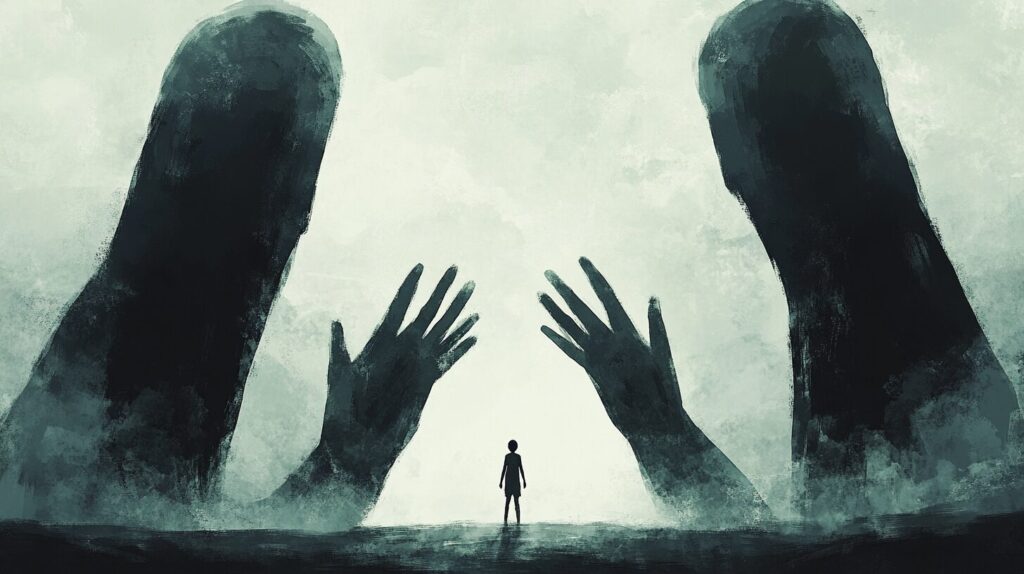
Loving your parents should feel natural, but for some of us, it’s not that simple. I’ve struggled with this for a long time.
There are moments when I want to feel close to my parents, to love them like I used to, but something inside me just won’t let it happen.
This leaves me feeling confused and guilty. I know my parents did their best, but the hurt from the past still lingers.
So, what do you do when you want to love your parents, but you just can’t? This is the question I’ve been wrestling with, and I want to share my journey with you.
Adult Relationships with Parents

When we think about our relationships with our parents as adults, it’s important to understand how past experiences shape our feelings today.
Childhood trauma, like being neglected, criticized, or even abused, can have a lasting impact.
These painful memories often create a barrier between us and our parents, making it hard to feel emotionally close to them.
Over time, this emotional distance can turn into resentment.
Even if we rationally understand that our parents did the best they could, the unresolved pain from the past can keep us from fully connecting with them.
This leads to a confusing mix of emotions. We may feel guilty for not being able to love them like we want to, and this guilt only adds to the emotional burden.
In this situation, it’s common to feel stuck.
You want to forgive and move forward, but each time you try, the old wounds reopen, bringing back feelings of anger, sadness, or disappointment.
This can make you question yourself, wondering why you can’t just let go and love your parents like you’re supposed to.
But these feelings are more common than you might think, and they don’t mean something is wrong with you.
It’s part of the complex nature of human relationships, especially when past hurts are involved.
You’re Not Responsible for Your Parents’ Happiness

It’s easy to feel like you need to make your parents happy, especially if you’ve had a rocky relationship with them.
But one of the most important things to understand is that their happiness is not your responsibility.
You can’t control how they feel or how they react to things. Trying to do so can leave you feeling frustrated and drained because it’s an impossible task.
Setting healthy boundaries with your parents is essential.
These boundaries help you protect your own emotional space and prevent you from getting overwhelmed by their needs or expectations.
When you establish boundaries, you’re not being selfish; you’re taking care of yourself.
Without these boundaries, you might feel constant pressure to fix things for your parents, which can lead to feelings of guilt and stress when you inevitably fall short.
As you work through these feelings, it’s also important to practice self-compassion.
Be kind to yourself and recognize that it’s okay to struggle. Healing from past hurts and learning to navigate your relationship with your parents takes time.
Celebrate the progress you make, even if it feels small.
And remember, it’s okay to prioritize your own well-being, even if that means stepping back from trying to make your parents happy all the time.
Letting go of that guilt is a crucial step in your journey of healing and self-discovery.
The Challenge of Forgiveness and Connection
Forgiving your parents and trying to reconnect with them can be one of the hardest challenges you’ll face.
On one hand, you might understand that your parents were doing their best with what they knew and had.
You might even recognize that they didn’t mean to hurt you. But understanding this logically doesn’t always translate into emotional healing.
It’s like there’s a wall between what you know in your head and what you feel in your heart.
This emotional conflict can be incredibly frustrating. You might tell yourself that you should be able to let go of the past and move on, but the pain lingers.
Even if you know deep down that your parents didn’t intentionally cause harm, it doesn’t always make the hurt go away.
This is what makes forgiveness so challenging—knowing that you should forgive, but struggling to actually feel it.
Many people try to reconnect with their parents, hoping that forgiveness will come with time and effort.
You might reach out more, try to have deeper conversations, or spend more time together, all in the hope of rebuilding the bond.
But these attempts can be difficult and often lead to setbacks. It’s hard when you put in the effort, but the connection doesn’t happen the way you want it to.
You might feel discouraged or like you’re failing at something that should be natural.
But it’s important to remember that you’re not alone in this struggle. Many people go through similar experiences, and it’s okay to find it hard.
Rebuilding relationships after they’ve been damaged takes time, patience, and sometimes, the acceptance that things might never be perfect.
The key is to keep trying, while also being kind to yourself during the process.
Childhood Trauma

Childhood trauma, especially something as devastating as sexual abuse, leaves deep and lasting scars.
For me, this trauma was like a hidden wound that I didn’t fully recognize or understand until much later in life.
During my childhood, I couldn’t fully process what had happened to me, and it wasn’t until I reached high school that the memories began to resurface.
At first, I wanted nothing more than to push these memories away, to bury them so deep that they would never see the light of day.
The pain was too overwhelming, and the idea of confronting it felt impossible.
But as much as I tried to ignore or forget what had happened, the trauma didn’t just disappear.
Instead, it started to seep into different parts of my life, particularly in how I viewed and interacted with my parents.
Even though they weren’t directly involved in the abuse, the trauma created an invisible barrier between us.
I began to feel a growing distance from them, a sense that they had somehow let me down, even if they hadn’t meant to.
This growing distance was fueled by feelings of blame and resentment.
I couldn’t help but wonder why they hadn’t noticed something was wrong, why they hadn’t been there to protect me when I needed them most.
These questions haunted me, making it hard to trust them or feel safe around them. The more I thought about it, the angrier I became.
It felt like they had failed me in the worst way possible, even though, deep down, I knew they hadn’t intended any harm.
The anger and hurt I felt towards my parents started to build up over time.
It wasn’t just about the abuse itself, but also about the feeling that my parents hadn’t been able to shield me from that pain.
This resentment made it incredibly difficult to forgive them or to see them in the same light as before.
Every time I tried to get closer to them, those old feelings of anger and sadness would come rushing back, reminding me of the trauma and the distance it had created between us.
This struggle with forgiveness is something I’m still dealing with. It’s an ongoing process, trying to reconcile the love I want to feel for my parents with the hurt that still lingers.
The trauma has left a permanent mark on our relationship, one that I’m slowly learning to navigate as I continue my journey towards healing.
I know that rebuilding the connection with my parents won’t be easy, but it’s something I’m working towards, one step at a time.
Coping Mechanisms and Their Consequences
When dealing with the pain from my past, I turned to weed and gambling as ways to cope.
At first, these things seemed to help.
Smoking weed helped me escape from my thoughts, and gambling provided a distraction that made me feel in control, even if just for a moment.
But what started as a way to numb my emotions quickly spiraled into something more harmful.
The temporary relief I got from these behaviors soon led to more problems, making me feel even more lost and out of control.
The impact on my life was significant. My relationships began to suffer, my work performance dropped, and my overall well-being took a hit.
I was using these coping mechanisms to avoid dealing with my emotions, but they were only masking the deeper issues I needed to face.
Eventually, I hit rock bottom. I reached a point where I could no longer ignore the fact that weed and gambling were ruining my life.
It was a harsh wake-up call, but it forced me to confront the pain I had been avoiding for so long.
Realizing that these behaviors were not the answer was the first step towards healing.
It wasn’t easy, but it marked the beginning of finding healthier ways to cope and start the process of recovery. Please check in case you need help:
- https://ift.tt/MDmNVOk
- https://ift.tt/p7Gvb4f
Navigating the Desire for Intimacy and Connection
Growing up, I often found myself yearning for those close, intimate moments with my parents—moments where it was just us, sharing a laugh, a conversation, or simply enjoying each other’s company.
I craved those connections, but they rarely happened. When they did, they were often overshadowed by larger family gatherings or other distractions.
This left me feeling disappointed and frustrated, as if something important was missing from our relationship.
This longing for closeness that was never fulfilled made our relationship even more complicated.
Each missed opportunity to connect only deepened the emotional distance between us.
It was hard not to feel hurt when those moments didn’t happen, and that hurt gradually turned into resentment, making it even harder to bridge the gap.
On top of this, I found myself stuck in a confusing emotional conflict.
On one hand, I wanted to forgive my parents and move forward, to feel the love that I knew was there somewhere.
But on the other hand, my emotions wouldn’t cooperate.
Even though I understood rationally that I should let go of the past and embrace my parents, emotionally, I just couldn’t do it.
This disconnect between my head and my heart created a constant internal struggle.
Navigating these feelings has been a significant challenge. It’s not easy to balance the rational desire to heal with the emotional barriers that stand in the way.
But I’m slowly learning to accept that this is part of the journey—understanding that it’s okay to struggle with these conflicting emotions and that the path to connection and intimacy with my parents may be longer and more complicated than I had hoped.
Moving Forward: What’s Next?
Moving forward, one of the most important steps is accepting the situation for what it is.
It’s not easy to let go of the idea that your relationship with your parents should be perfect, but accepting the reality of the situation can bring a sense of peace.
Not all wounds can be fully healed, and not all relationships can be perfectly mended.
Sometimes, the best thing you can do is focus on your own healing, rather than trying to fix everything.
This process of healing starts with you. Instead of putting all your energy into trying to change your relationship with your parents, it’s helpful to turn that energy inward.
Work on healing the emotional wounds that have been left by the past. Accepting that some things are out of your control can be incredibly freeing.
It allows you to let go of unrealistic expectations and to stop feeling responsible for making everything right.
To help with this, there are some practical steps you can take.
Seeking therapy is a great way to have a safe space where you can talk about your feelings and get professional guidance on how to heal.
A therapist can help you understand your emotions better and find healthier ways to cope. Journaling is another powerful tool.
Writing down your thoughts and feelings can help you process them and see your progress over time.
It’s also important to set realistic expectations for your relationship with your parents.
Understand that it might never be perfect, but that doesn’t mean it can’t be meaningful in its own way.
Official post by Joanne at Sacred Joanne
source https://sacredjoanne.com/when-you-cant-love-your-parents-and-it-hurts/

No comments:
Post a Comment